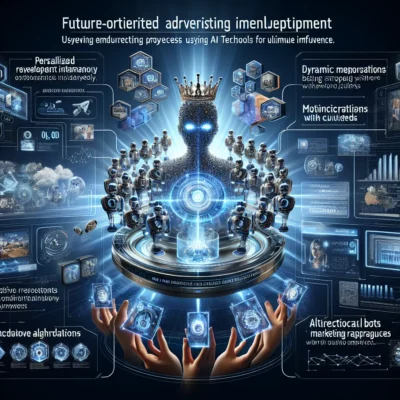The Power of AI in Modern Marketing
Artificial Intelligence (AI) has revolutionized various industries, and marketing is no exception. From its early days of simple automation tools to today’s sophisticated algorithms, AI has transformed how businesses interact with their customers. The importance of engagement and interactivity in marketing cannot be overstated. Engaging content captures attention, fosters connection, and drives conversions. With AI, businesses can now create highly personalized and interactive marketing materials that resonate with their audience on a deeper level.
Personalization at Scale
One of the most significant advantages of AI in marketing is its ability to analyze vast amounts of customer data to create personalized content. By leveraging machine learning algorithms, AI can identify patterns and preferences, enabling marketers to tailor their messages to individual customers.
Examples of Personalized Marketing Campaigns Powered by AI:
- Netflix: Uses AI to recommend shows and movies based on viewing history.
- Amazon: Provides personalized product recommendations based on past purchases and browsing behavior.
- Spotify: Curates personalized playlists using AI to analyze listening habits.
Benefits of Personalized Marketing:
- Increased Engagement: Personalized content is more likely to capture attention and encourage interaction.
- Higher Conversion Rates: Tailored messages resonate better with customers, leading to higher conversion rates.
- Customer Loyalty: Personalized experiences foster a sense of connection, enhancing customer loyalty.
Dynamic Content Creation
AI tools have made it possible to generate dynamic and interactive content effortlessly. These tools can create everything from blog posts and social media updates to videos and infographics.
Case Studies of AI in Content Creation:
- The Washington Post: Uses an AI tool called Heliograf to write basic news reports, freeing up journalists to focus on more complex stories.
- HubSpot: Employs AI to generate blog post ideas and even draft content, helping marketers maintain a consistent publishing schedule.
Tips for Integrating AI-Generated Content:
- Start Small: Begin with simple tasks like social media posts or email subject lines.
- Maintain Human Oversight: Ensure that AI-generated content aligns with your brand voice and values.
- Continuously Optimize: Use performance data to refine and improve AI-generated content over time.
Chatbots and Virtual Assistants
AI-driven chatbots and virtual assistants have become essential tools for enhancing customer interaction. These tools can handle a wide range of tasks, from answering frequently asked questions to guiding customers through the purchase process.
Examples of Effective Chatbot Implementations:
- Sephora: Uses a chatbot to provide personalized beauty advice and product recommendations.
- H&M: Employs a chatbot to help customers find clothing items based on their preferences and style.
Best Practices for Designing Conversational Experiences:
- Keep It Simple: Ensure that chatbots can handle basic queries effectively before adding more complex functionalities.
- Personalize Interactions: Use customer data to tailor responses and make interactions feel more personal.
- Provide Human Backup: Offer an option to connect with a human representative if the chatbot cannot resolve the issue.
Predictive Analytics for Better Targeting
AI’s ability to predict customer behavior and preferences is a game-changer for marketers. Predictive analytics uses historical data to forecast future actions, enabling businesses to tailor their marketing messages more effectively.
Real-World Examples:
- Target: Utilizes predictive analytics to identify customers who are likely to be pregnant and tailor marketing messages accordingly.
- Starbucks: Uses AI to predict which products customers are likely to purchase based on their past behavior and preferences.
Using Predictive Analytics:
- Segment Your Audience: Group customers based on predicted behaviors and tailor messages to each segment.
- Optimize Timing: Send marketing messages when customers are most likely to engage.
- Personalize Offers: Provide personalized promotions and discounts based on predicted preferences.
Enhancing Visual and Video Content
Visual and video content are crucial for capturing audience attention. AI tools can create engaging visuals and videos that enhance marketing campaigns.
AI Tools for Visual and Video Content:
- Canva: Offers AI-powered design suggestions to create stunning visuals.
- Lumen5: Uses AI to transform blog posts into engaging videos.
Techniques for Incorporating AI-Enhanced Visuals:
- Use AI for Design Inspiration: Leverage AI tools to generate design ideas and templates.
- Automate Video Creation: Use AI to quickly produce videos for social media and other platforms.
- Personalize Visuals: Tailor visuals to individual customer preferences using AI.
Measuring Success and ROI
Evaluating the effectiveness of AI-driven marketing materials is crucial for continuous improvement. Various metrics and tools can help track engagement and conversion rates.
Metrics for Evaluating Effectiveness:
- Click-Through Rates (CTR): Measure how often users click on your marketing materials.
- Conversion Rates: Track the percentage of users who take the desired action.
- Customer Engagement: Monitor interactions, shares, and comments on your content.
Tools and Platforms:
- Google Analytics: Provides insights into website traffic and user behavior.
- HubSpot: Offers comprehensive marketing analytics and reporting tools.
Strategies for Continuous Improvement:
- Analyze Data Regularly: Continuously monitor performance metrics to identify areas for improvement.
- A/B Testing: Experiment with different versions of your marketing materials to see what works best.
- Iterate and Optimize: Use data insights to refine and enhance your marketing strategies over time.
Future Trends in AI Marketing
The future of AI in marketing is bright, with emerging technologies set to revolutionize customer engagement.
Emerging AI Technologies:
- Natural Language Processing (NLP): Enhances the ability of AI to understand and generate human language.
- Augmented Reality (AR): Combines AI with AR to create immersive marketing experiences.
- Voice Search Optimization: Uses AI to optimize content for voice search queries.
Predictions for the Future:
- Increased Personalization: AI will enable even more precise and personalized marketing experiences.
- Enhanced Customer Insights: Advanced analytics will provide deeper insights into customer behavior and preferences.
- Seamless Integration: AI will become seamlessly integrated into all aspects of marketing, from content creation to customer service.
Businesses that embrace these advancements will stay ahead of the curve and continue to engage their customers in innovative ways.
